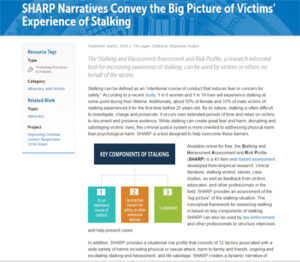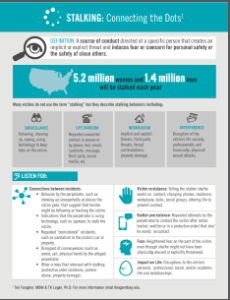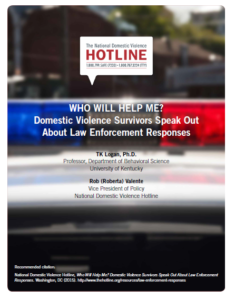In other news, our co-founder and research partner, TK Logan, has been developing an online assessment tool to identify coercive control and abuse in relationships that may not include physical violence. The absence of physical violence is often very confusing for victims of coercive control who feel emotionally and psychologically battered and sometimes stalked, but do not consider themselves victims of abuse. After the assessment is piloted and finalized, it promises to help people recognize coercive control, the harms it can cause and the risk it may portend, and steps they can take to enhance their safety and get help. It will be available on Dr. Logan’s website, www.coercivecontrol.org, with a link on this website.
Category: Link
SHARP Narratives Convey the Big Picture of Victims’ Experience of Stalking

The Stalking and Harassment Assessment and Risk Profile, a research informed tool for increasing awareness of stalking, can be used by victims or others on behalf of the victim.
STALKING: Connecting the Dots!
Fact sheets to help law enforcement, advocates, judges, mental health professionals, probation and parole officers, friends, family, victims and survivors understand stalking and what they can do about it!

Stalking-Connecting-the-Dots_Victim
STALKING: Connecting the Dots! (For Advocates)
STALKING: Connecting the Dots! (For Judges)
STALKING: Connecting the Dots! (For Law Enforcement)
STALKING: Connecting the Dots! (For Victims)
STALKING: Connecting the Dots! (For Friends)
STALKING: Connecting the Dots! (For Probation and Parole)
STALKING: Connecting the Dots! (For Mental Health Professionals)
Who Will Help Me? Domestic Violence Survivors Speak Out About Law Enforcement Responses
UK Professor Helps Develop Online Assessment for Stalking Victims
From UK NOW
LEXINGTON, Ky. (April 10, 2015) — TK Logan, professor in the University of Kentucky Department of Behavioral Science and the Center on Drug & Alcohol Research, and a team of researchers recently launched an online assessment for victims of stalking and harassment.
“Kentucky has the highest rate of stalking in the nation: one in four women in Kentucky will be stalked compared to one in six nationally,” Logan said. “To help address this issue, we have translated 20 years of research into a tool for use by a variety of audiences. We are proud that something like this came from research in Kentucky where we need to do something about the prevalent issue of stalking to protect victims, children, and communities.”




